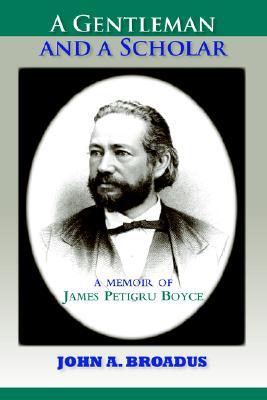- Bible
- Read the Bible
- Bible Versions
- Verse of the Day
- Reading Plans
- Verses by Topic
- Books of the Bible
- Bible Images
- Study
- Commentaries
- Concordances
- Dictionaries
- Encyclopedias
- Sermons
- Bible Atlas & Maps
- BP Wiki
- Devotionals
- Today's Devotionals
- Light of the World
- All Devotionals
- Inspirational Quotes
- More
- Picture Quotes
- Videos
- Inspirational
- Bible Study
- What The Bible Says
- Bible Q&As
- Daily Bread
- Bible by Genre
- Bible Stories
- Random Bible Verse
- Community
- Store
A Gentleman and a Scholar: Memoir of James P. Boyce (Paper)
by John A. Broadus
"The Memoir of James P. Boyce by his loyal friend and colleague, John Broadus, contains a wealth of wisdom, practical theology and testimonies of God's providence in the life of one of prime shapers of early Southern Baptist life and thought. This book provides a wonderful portrait of a denominational statesman, pastor, theologian and educator." - Tom Ascol "The term 'graceful' in its most basic sense of 'being full of grace' well applies to the life of James Petigru Boyce. God's grace gave him rich resources of theological wisdom as well as a winsome personality. These led to his becoming a key leader among the Southern Baptists, one who inspired others to embrace his deeply-held God-glorifying goals. As such, his was a life that profoundly shaped this Baptist community in the late nineteenth century and still speaks powerfully today of the importance and impact of a Christian life lived for the glory of Christ." - Michael A G Haykin
BUY NOW
Paperback, 392 pages
Published October 7th 2004 by Solid Ground Christian Books (first published September 1st 2004)
© 2025 Bibleportal.com All rights reserved.

John Albert Broadus was an American Baptist pastor and professor at the Southern Baptist Theological Seminary, one of the most famous preachers of his day. Charles Spurgeon deemed Broadus the “greatest of living preachers.” Church historian Albert Henry Newman later said “perhaps the greatest man the Baptists have produced.
Broadus was born in Culpepper County, Virginia, 24 January, 1827. He was educated at the University of Virginia, and from 1851 till 1853 was assistant professor of ancient languages there. He then became pastor of the Baptist church in Charlottesville, and in 1859 professor of New Testament interpretation and homiletics in the Southern Baptist theological seminary at Greenville, South Carolina, now in Louisville, Kentucky As a Greek scholar and New Testament critic.
His quiet conversational delivery brought both critics and imitators. Some men, who equated "real preaching" with soaring in the oratorical stratosphere, accused Broadus of "ruining the preachers of the South" by his example. His students, however, saw his effectiveness and in spite of his warning, many of them tried to imitate his tones, his genuine pathos, his platform manner, failing to realize that they had only a few of his external characteristics and not the qualities of his success.
... Show more